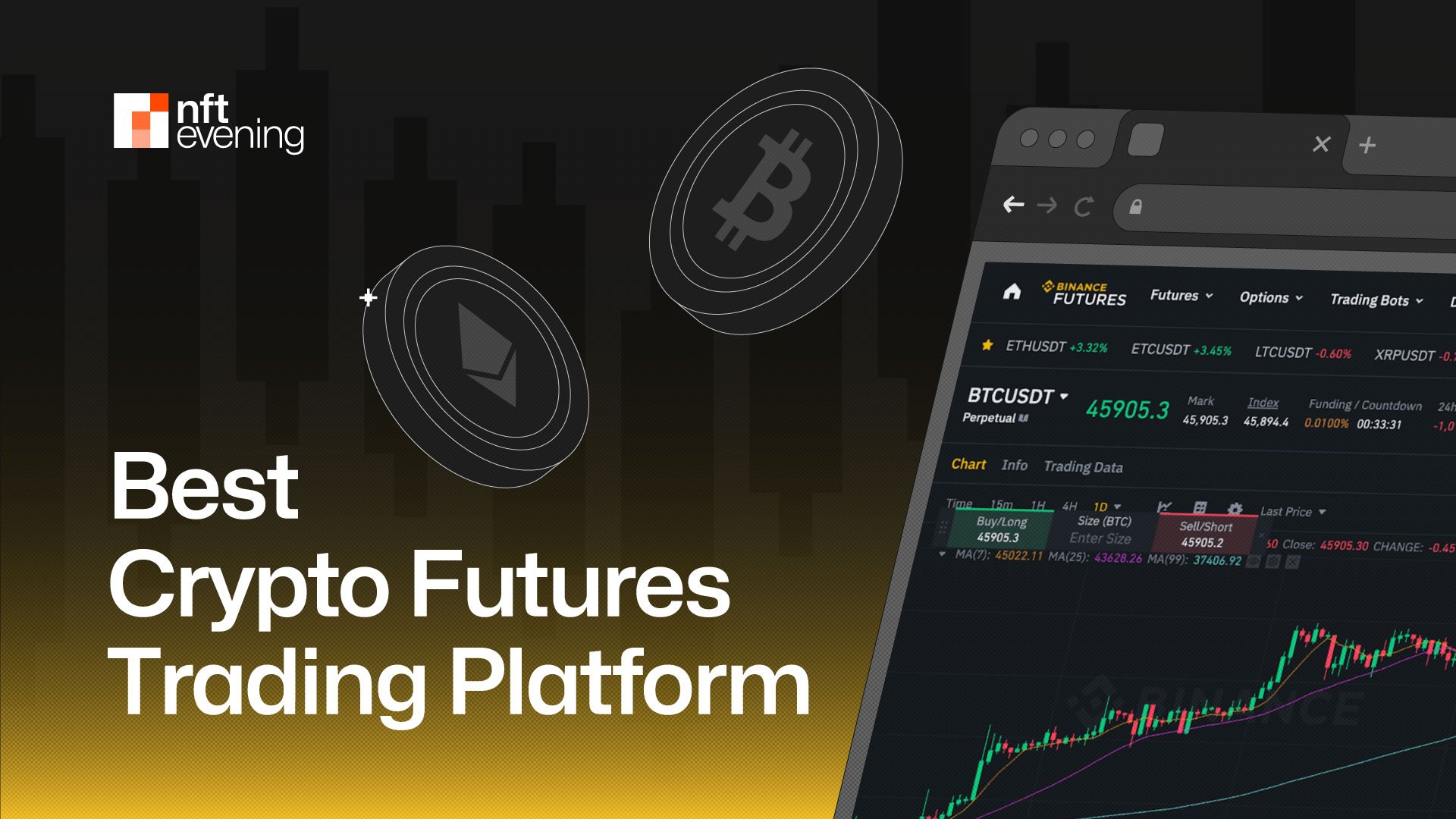Top 8 Crypto Futures Trading Platforms to Watch in 2025

A Comprehensive Guide to Crypto Futures Trading: Platforms, Strategies, and Risks
Understanding Crypto Futures Trading
Crypto futures trading allows investors to speculate on the future price movements of cryptocurrencies without actually owning the assets. This trading method provides opportunities to earn profits in both bullish and bearish markets. By utilizing platforms that offer leverage, traders can amplify their potential returns, although this comes with inherent risks that necessitate careful planning. Selecting a reliable and intuitive trading platform is essential for achieving success in this arena.
- Understanding Crypto Futures Trading
- Top Crypto Futures Trading Platforms Ranked
- In-Depth Reviews of the Best Futures Trading Platforms
- 1. Binance Futures
- 2. Bitget Futures
- 3. Bybit Futures
- 4. MEXC
- 5. OKX Futures
- 6. Coinbase Advanced
- 7. Kraken Pro
- 8. Gemini Derivatives
- What is a Crypto Futures Exchange?
- How to Choose a Crypto Futures Trading Platform
- Safety Measures
- Trading Volume
- Futures Fees
- Leverage Options
- Cryptocurrencies and Trading Pairs
- Ease of Use
- Customer Support and Tools
- Benefits and Risks of Crypto Futures Trading
- Benefits
- Risks
- Types of Crypto Futures
- Perpetual Contracts
- Traditional Futures
- Inverse Futures
- Options on Futures
- Leverage Tokens
- How to Trade Crypto Futures
- Best Markets for Trading Cryptocurrency Futures
- Conclusion
- FAQ
- Can you trade futures in the U.S.?
- What is the best crypto futures trading platform in the U.S.?
- What is the best crypto for futures trading?
- Is crypto futures trading profitable?
- What is the most trusted crypto futures trading platform?
- What is leverage in crypto futures trading?
Top Crypto Futures Trading Platforms Ranked
After evaluating over 30 cryptocurrency exchanges based on factors such as leverage, security, fees, and user experience, we have compiled a list of the eight best platforms for trading crypto futures:
- Binance: The leading platform for crypto futures trading.
- Bitget: Ideal for trading altcoin futures.
- Bybit: Recognized as the best platform for crypto derivatives.
- MEXC: Known for its low trading fees.
- OKX: A regulated exchange for futures trading.
- Coinbase: The top choice for U.S. crypto futures trading.
- Kraken: The safest option for futures trading.
- Gemini: The best platform for Bitcoin futures.
In-Depth Reviews of the Best Futures Trading Platforms
1. Binance Futures
Binance Futures stands as the largest cryptocurrency derivatives platform globally. Since its launch in late 2019, it has gained immense popularity, recording a staggering trading volume of over $1 trillion. The platform offers more than 340 trading pairs and allows leverage of up to 125x. With competitive fees starting at 0.02% for makers and 0.05% for takers, Binance provides advanced trading tools, including real-time charts and various order types. Security features such as two-factor authentication and cold storage further enhance user safety.
Pros:
- High liquidity with a daily trading volume of $50 billion.
- Extensive range of trading pairs.
- Advanced trading tools for all experience levels.
Cons:
- Regulatory challenges in certain jurisdictions.
- Futures trading is not available for U.S. users on Binance.
2. Bitget Futures
Bitget is a centralized platform based in Singapore, known for its strong futures trading capabilities and copy trading features. It offers up to 125x leverage on over 560 derivative pairs. With a robust matching engine ensuring swift trade execution and a protection fund exceeding $600 million, Bitget prioritizes user security. The platform’s competitive fee structure includes 0.02% for makers and 0.06% for takers.
Pros:
- High leverage options.
- Unique copy trading feature for beginners.
- Strong asset protection measures.
Cons:
- Limited fiat-to-crypto trading options.
- Regulatory restrictions in some regions.
3. Bybit Futures
Bybit has emerged as a leading crypto derivatives trading platform, boasting over 60 million users and a daily trading volume exceeding $60 billion. It specializes in futures contracts, offering up to 100x leverage on major cryptocurrencies. Bybit’s user-friendly interface and advanced tools make it appealing to both novice and experienced traders.
Pros:
- High liquidity and diverse trading options.
- Advanced trading features, including copy trading.
- Reliable system uptime.
Cons:
- Not available in the U.S. and other restricted areas.
- Past security incidents have raised concerns.
4. MEXC
MEXC is recognized for its low trading fees and extensive cryptocurrency offerings, supporting over 3,000 cryptocurrencies. With leverage options up to 200x on perpetual contracts, MEXC stands out in the industry. The platform’s fee structure is highly competitive, with fees as low as 0.01% for makers.
Pros:
- Extremely low trading fees.
- High leverage for futures contracts.
- Demo trading mode for practice.
Cons:
- No direct fiat withdrawals.
- Limited liquidity for lesser-known cryptocurrencies.
5. OKX Futures
OKX is a well-regulated crypto futures trading platform that serves millions of users across various countries. It supports over 300 cryptocurrencies and offers leverage up to 125x. OKX emphasizes security with bank-level encryption and regular Proof of Reserves reports.
Pros:
- High liquidity and low trading fees.
- Advanced trading tools and features.
- Strong security measures.
Cons:
- High withdrawal fees compared to other exchanges.
- Futures trading is restricted in the U.S.
6. Coinbase Advanced
Coinbase is the go-to platform for U.S. traders, offering a secure environment for futures trading. With nano-sized contracts and a user-friendly interface, Coinbase is ideal for beginners. The platform has recently acquired a CFTC-regulated derivatives exchange, allowing for federally regulated futures trading.
Pros:
- Regulated and compliant with U.S. laws.
- User-friendly interface with educational resources.
- 24/7 trading access for various cryptocurrencies.
Cons:
- Limited leverage options for U.S. traders.
- Customer service issues reported by users.
7. Kraken Pro
Kraken is known for its strong security measures and regulatory compliance. It offers a high-performance trading platform with low latency and supports a wide range of cryptocurrencies. Kraken’s fee structure is competitive, making it an attractive option for traders.
Pros:
- Extensive range of futures contracts.
- Regulated by reputable authorities.
- Advanced trading tools and features.
Cons:
- Limited access for U.S. retail traders.
- Past regulatory issues may raise concerns.
8. Gemini Derivatives
Gemini is a highly secure cryptocurrency derivatives exchange based in New York. It offers perpetual futures with up to 100x leverage and is known for its regulatory compliance. Gemini prioritizes security, holding most assets in cold storage.
Pros:
- High security and regulatory compliance.
- User-friendly trading platform.
- Offers cross-collateralization for trades.
Cons:
- Derivatives trading is restricted in several regions.
- Limited cryptocurrency pairs for futures trading.
What is a Crypto Futures Exchange?
A crypto futures exchange is a platform where users can trade contracts to buy or sell cryptocurrencies at predetermined prices on future dates. These exchanges allow traders to utilize leverage, enabling them to control larger positions with smaller amounts of capital. Traders can choose to go long or short based on their market predictions, and while traditional futures contracts have expiration dates, perpetual contracts do not.
How to Choose a Crypto Futures Trading Platform
Safety Measures
Select a platform that prioritizes security, featuring two-factor authentication and cold storage options. Research user reviews and ensure compliance with local regulations.
Trading Volume
High trading volume is crucial for executing trades quickly and efficiently. Platforms with significant activity, like Binance, minimize slippage and enhance trading experiences.
Futures Fees
Examine the fee structures of various platforms, focusing on maker and taker fees. Some exchanges, like MEXC, offer low trading fees, which can significantly impact profitability.
Leverage Options
Leverage allows traders to amplify their positions, but it also increases risk. Choose a platform that offers leverage levels that align with your risk tolerance.
Cryptocurrencies and Trading Pairs
Opt for a platform that provides a diverse range of cryptocurrencies and trading pairs to maximize trading opportunities.
Ease of Use
A user-friendly interface is essential for a smooth trading experience. Look for platforms that offer demo accounts for practice and advanced tools for seasoned traders.
Customer Support and Tools
Reliable customer support is vital for resolving issues. Test response times and ensure the platform offers useful trading tools, such as stop-loss orders.
Benefits and Risks of Crypto Futures Trading
Benefits
- Profit potential in both rising and falling markets.
- Leverage allows for larger positions with less capital.
- Ability to hedge existing crypto holdings.
- 24/7 trading opportunities.
- High liquidity for quick trade execution.
- Advanced strategies can be employed for tailored trading.
Risks
- Price volatility can lead to significant losses.
- Leverage can amplify losses, risking capital.
- Margin calls may require additional funds.
- Regulatory changes can impact trading access.
Types of Crypto Futures
Perpetual Contracts
These contracts have no expiration date and closely follow the spot market. They are popular for both short- and long-term trading.
Traditional Futures
Contracts that specify a price for a future date, allowing traders to lock in prices.
Inverse Futures
Contracts priced in cryptocurrency rather than fiat, which can complicate profit and loss calculations.
Options on Futures
These provide the right, but not the obligation, to buy or sell a futures contract at a predetermined price.
Leverage Tokens
Tokens that offer leveraged exposure to crypto prices without the complexities of margin trading.
How to Trade Crypto Futures
- Choose a Platform: Select a reliable trading platform with strong security and high trading volume.
- Set Up Your Account: Create an account, complete verification, and deposit funds.
- Pick a Trading Pair: Choose the cryptocurrency pair and contract type.
- Place Your Trade: Open the trading section, select your pair, set leverage, and place your order.
- Monitor Your Position: Keep track of your trade and adjust your stop-loss or take-profit orders as needed.
Best Markets for Trading Cryptocurrency Futures
Bitcoin and Ethereum are the most favorable markets for futures trading due to their high liquidity and trading volume. Both cryptocurrencies are widely supported across major exchanges, providing ample trading tools and analytics.
Conclusion
In summary, crypto futures trading offers a dynamic way to engage with the cryptocurrency market. Selecting the right platform is crucial for success, with Binance emerging as a top choice due to its extensive trading options and low fees. For U.S. traders, Coinbase provides a regulated and user-friendly alternative. Other platforms like Bybit, MEXC, and Kraken also offer competitive features and security.
FAQ
Can you trade futures in the U.S.?
Yes, but not all exchanges offer futures trading due to strict regulations. Platforms like Coinbase comply with CFTC rules for U.S. traders.
What is the best crypto futures trading platform in the U.S.?
Coinbase is regarded as the best option for U.S. traders, offering regulated futures trading and a user-friendly interface.
What is the best crypto for futures trading?
Bitcoin and Ethereum are the top choices due to their liquidity and market demand.
Is crypto futures trading profitable?
Yes, but profitability depends on strategy, market knowledge, and risk management.
What is the most trusted crypto futures trading platform?
Binance is widely regarded as the most trusted platform globally, though U.S. users should use Binance.US for compliance.
What is leverage in crypto futures trading?
Leverage allows traders to control larger positions with less capital, increasing both potential profits and risks.







